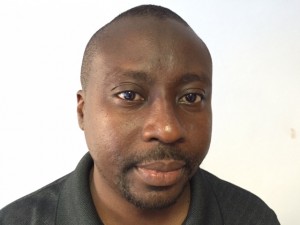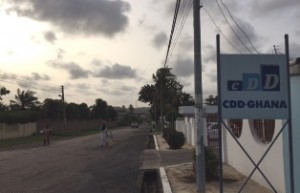Researching the politics of development
Blog

Spotlight on an ESID researcher: Franklin Oduro
 15 April 2016
15 April 2016
What is your educational background?
I am a political scientist by training. My first degree was in political science with history at the University of Ghana, followed by a Masters, where I focused on human rights institutions, looking at Ghana’s Commission on Human Rights and Administrative Justice. In 2000 I started working for the Ghana Center for Democratic Development (CDD) in my spare time and I’ve been here for 16 years. I am interested in transitional justice, human rights, truth commissions, election administration, policy analysis and African political thought.
Between 2005 and 2010 I took study leave to do a PhD at Carleton University in Canada, researching how countries in transition from conflict, civil wars and authoritarian regimes use non-legal, non-traditional measures to address past human rights violations. The South African Truth and Reconcilation Commission was adopted by many countries as a model to deal with past injustices and abuses, in order to have a clean slate moving forward, especially when becoming a democracy.
Then in 2011 I came back to CDD. It’s been my first love, working in a research and policy thinktank.
What are your roles in CDD?
I am happy to be the Head of Research and Programs, and I also do administrative work, as Deputy Chief Executive Director. My roles require multi-tasking, and I divide my time between my own research and writing and overseeing what goes on here – how we meet our contractual agreements with partners and donors, and what kind of team to put in place. I also represent the Center in both electronic and print media, and have the diplomatic role of meeting visitors to the Center.
What is your role with ESID?
My involvement comes from two perspectives. As Head of Research, I oversee the management of our collaborative partnership with ESID and The University of Manchester. The second part is my own role in the education research project. I lead the team here to do that research. I am an honorary fellow of The University of Manchester, and hope to spend some time there.
Which of ESID’s findings on Ghana have particularly surprised or excited you?
We have been following the nature of Ghana’s politics and how it creates room for patronage, clientelism, a lack of accountability and short-term, policy-driven politics, as against long-term sustainability. If you want to win votes and get elected in Ghana, you are tempted to produce the kind of policies that produce physically visible results, so that citizens and voters think that you are performing. This runs through all the findings of our Ghana studies, whether in growth, oil, or education and health.
However, if you go deeper into investigating this at the micro level, insights emerge in terms of pockets of opportunities for something positive to happen. In the midst of a national character of patronage-informed governance and development processes, we still find some ‘pockets of effectiveness’ at certain levels, that we can tap into to change the narrative at the national level. This is something that we need to showcase.
Ghana is a very interesting country. We have the ideas about what is good to do, many of our laws and policies are aimed at doing the right thing, but it’s how we implement these effectively that becomes a challenge. Because of the existence of these good policies or laws, where citizens or groups are able to figure out the spaces of opportunity that exist, then we can take advantage of that to really produce effectiveness at the local level.
The challenge is how to identify these pockets of effectiveness across the many sectors; then we can showcase them to serve as models – a kind of bottom-up approach to change the narrative at the national level.
What do you see as the key challenges for development in Ghana?
As a political scientist I would sum up the main challenge as the lack of long-term focus in terms of the policies or programmes that we need to embark on, so that we can move beyond where we are towards a more structural transformation of society. We are unable to do that because of the short-term electoral gains and interests that are the order of the day.
In our democratic system, all powers are concentrated in the presidency, so if you capture the presidential throne you capture and can control all the wealth and resources that come with it. This makes our electoral competition very closely fought. People will do many things to acquire that victory.
We don’t lack the ideas. There is broad consensus among the political elite – that human resources development is key, in order to be able to face the challenges of the world. We also know we need to diversify our economy, that we cannot rely on cocoa, gold or even oil alone. In terms of what kind of growth we are experiencing, it’s not enough to say that we are growing at 6 or 7%; what is important is what sectors this growth is coming from.
If you happened to find yourself in Ghana in an election year, you would be amazed at the kind of policies and ideas the parties supply, and you would think that any party, once elected, should be able to do the right thing. But once they get to power, then that agenda deviates towards how to get back in power in the next four years.
If this means building more schools and infrastructure, which people will see, this becomes preferable to investing in the human capacity to go to school. Nobody sees how many children have been able to get an education or the quality of their education.
Poverty provides some justification for this. Last week I was driving across a remote part of Northern Ghana, where you still see schools that lack a physical structure, where people sit around a tree. So if you were in government, you would think, ‘I’m going to produce a building for this school, this is a good thing’. People will love you for that, and because they have seen it, they will give you the vote.
But what about the teachers in that school, or the quality of the teaching?
Finally – what do you like to do in your spare time?
For the most part I’m here at CDD, actually. There isn’t much spare time. I still work at weekends. The challenge is that during the week there’s a lot of meetings and visitors, but at weekends, when everyone’s not here, I have peace to do some intellectual stuff.
This year I’ve made it a policy not to work so much at weekends, and so I do hang out at home with family and friends. I like watching movies and also listening to music – as I’ve grown older I’ve fallen in love with jazz. I used to listen to R&B and highlife, but these days when I come home after work I need to listen to some sober stuff. My wife lives in Virginia, USA, so most years I go on holiday to the US for two or three weeks.
At CDD some of us enjoy what we do. That motivates us to put in a lot of effort and to achieve what we have been able to over the years – it’s a kind of pocket of effectiveness!
Read about ESID’s research on education, health, growth and natural resources in Ghana.
